
An Englishman abroad: The hidden life of Derek Nimmo
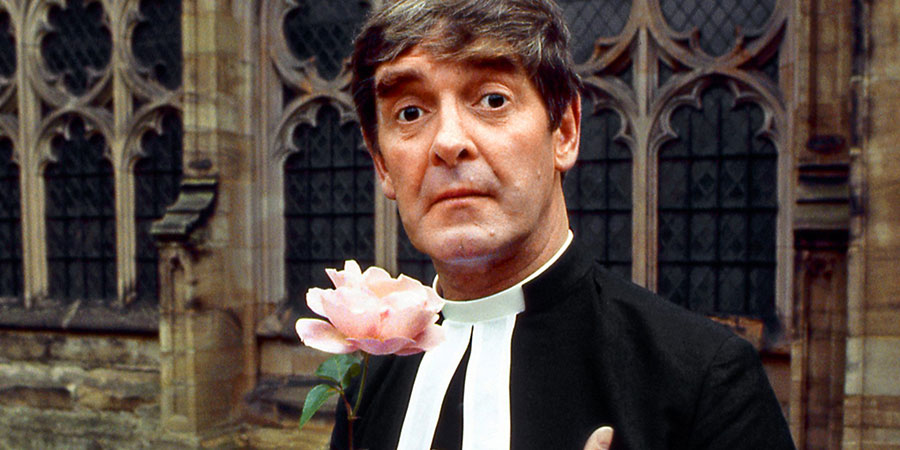
Some comic performers find fame only fleetingly. Some find fame and fight long and hard to hang on to it. Then there is Derek Nimmo. Derek Nimmo found fame, held on to it for a while and then seemed content to let most of it just fade away.
For a period during the Sixties and Seventies, Nimmo was one of Britain's most prominent comic performers. He starred in a succession of popular sitcoms, popped up as a guest star in innumerable plays and series, was a regular presence on talk shows and panel shows, and even, for a spell, had his own BBC chat shows (If It's Saturday, It Must Be Nimmo, 1970; Just A Nimmo, 1974-8).
After that, however, he seemed to step away. He was still only in his early fifties, but - unless one was an avid listener to Just A Minute, on which he would continue to be a regular and very impressive participant - the common impression, in his native Britain at least, was that Derek Nimmo no longer cared that much about his career.
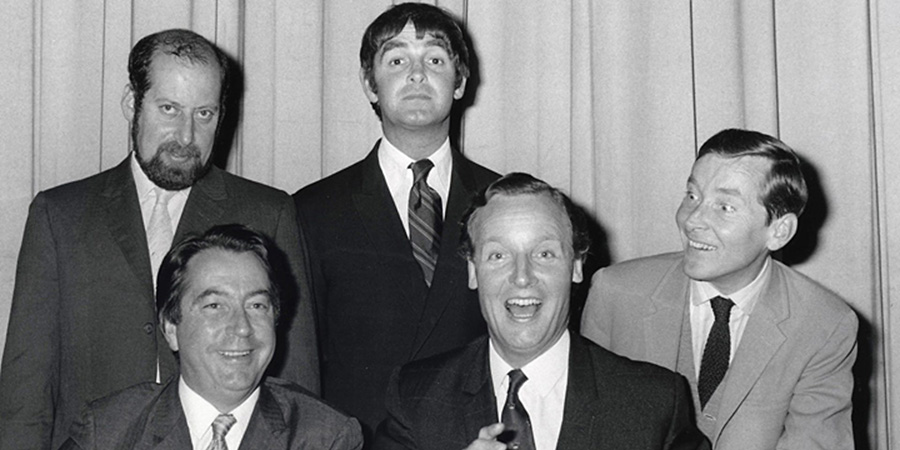
He certainly behaved as though he was now wealthy enough, and comfortable enough, not to take show business very seriously anymore. He acted, in fact, as though he had taken to flitting in and out of the text of a P. G. Wodehouse short story.
He even employed his own footman. Yes, really. Derek Nimmo actually had his own footman.
This footman, dressed in all the proper traditional red-jacketed and golden-bordered garb, including the black red-striped knee britches, would often be in attendance in the green room of TV and radio studios before and after each performance, standing there straight-backed and sombre-faced, ready to serve Nimmo several measures of seriously good vintage wine, in a shiny silver goblet, while everyone else was making do with glugging Blue Nun from a paper cup.
This was how Nimmo, by this stage in his life, liked to live. He resided in a luxurious apartment in Lexham Gardens, South Kensington (as well as owning a place in Spain and a beautiful old thatched cottage in the Northamptonshire village of Easton Maudit); had a wardrobe full of the most immaculately-tailored clothes; maintained a vast and hugely expensive wine cellar; travelled around town in either his Bentley or a chauffeur-driven Rolls-Royce; owned two boats (one moored in Chichester Harbour and the other in the South of France); piloted light aircraft; was a proud member of the Garrick and Beefsteak gentlemen's clubs, along with the Lord's Taverners' cricket charity; kept brood-mares in Australia (selling their offspring to the world's top racing stables); and his stated hobbies included 'sailing, and collecting English 17th and 18th century walnut furniture and Derby porcelain'.
It all seemed, in a way, quite improbable for someone who had spent the earliest part of his acting career living in a caravan based in a car park off London's Edgware Road - but then Derek Nimmo had always possessed a Gatsby-like belief in his ability to fashion the kind of life that he wanted to unfold and follow.
Born in Aigburth (pronounced 'Egg-burth'), Liverpool, in 1930, his serious and very moralistic father worked in insurance, and it was expected that Derek would follow dutifully in his father's footsteps. Derek, however, had other ideas.
He attended the city's Quarry Bank High School, later a comprehensive but in those days a grammar school run by an idealistic headmaster, RF Bailey, who believed in preparing his pupils for life rather than merely exams. He was the perfect patron for a callow individualist like Nimmo, encouraging him in his acting ambitions and indulging his eccentricities, which included riding to school on a vintage sit-up-and-beg bicycle, pointing the tips of his toes out at angles and smiling benignly at all those he passed as if he was the cheerfully concerned country curate that he sometimes dreamed of becoming.
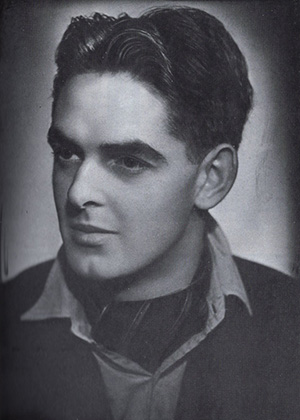
He - like the rest of his middle-class family - never did have a Scouse accent, and the speech therapy he received for his childhood stammer, along with several years living away in the Lake District during the war, moved him even further away from the typical sounds of the city. Once he left school at seventeen, he did take and pass the examinations required to begin a career in insurance, but, after a spell of National Service (during which he worked in Army Intelligence for MI6), he took a job instead with a paint company in Speke at £12 a week, while acting as an amateur whenever he could.
He turned professional in 1952, learnt his trade in local repertory companies and used his initiative to take on an unusually varied range of theatrically-related jobs that included spells as an assistant to the impresario Lew Grade; a road manager for the singer Al Martino; an audience 'plant' in the ventriloquist Peter Brough's stage shows; a comic performer in a roller-skating act; a pavement-pounding sandwich-board man (while wearing an alligator outfit) and an office-based publicist; as well as running a small agency that organised jazz concerts. After marrying his wife and fellow Liverpudlian actor Patricia Brown in 1955 (they met at a dance in a church hall in Penny Lane), they settled in London, where he began appearing regularly on television and radio as well as the stage.
It was a bungled bit of plastic surgery that ended up allowing him to monopolise the market for 'silly ass' roles. Someone had tripped him up in the Wolf Cubs while he was still a child living in Liverpool, leaving him with a broken nose, but when he could afford to have it straightened (with a view to making him look more like a romantic leading man), the surgeon - Sir Archibald MacIndoe at Stoke Mandeville - 'went too far' and left a dip in it, giving him, as he would put it, 'the perfect silly man's profile'.
Nimmo never complained. The look proved too lucrative for that. 'I know my brand image now, like everyone's favourite sauce,' he said. 'I know my goods and what sells them.'
Whenever a producer wanted a 'young upper-class twit type', Nimmo's was now usually the first name on their list. He thus went on to play Bingo Little in the BBC series The World Of Wooster (1965-7) and the Honourable Freddie Threepwood in the BBC's adaptation of Blandings Castle (1967). He also supplied similarly posh nice-but-dim characters for one-off episodes of such shows as Hancock, Steptoe And Son, Sykes and Hugh And I.
By this time, the BBC had become so impressed by his gift for light comedy that it had signed him up to an exclusive long-term contract expressly for sitcoms, and used him regularly on a variety of projects during the next few years. He appeared as Sheila Hancock's timid and somewhat vague boyfriend in The Bed-Sit Girl (1966), a shy bachelor in Sorry I'm Single (1967), Jimmy Clitheroe's stammering next-door neighbour in The Clitheroe Kid (1967) and a wealthy but gaffe-prone young pioneering filmmaker in Keep 'Em Rolling (1970).
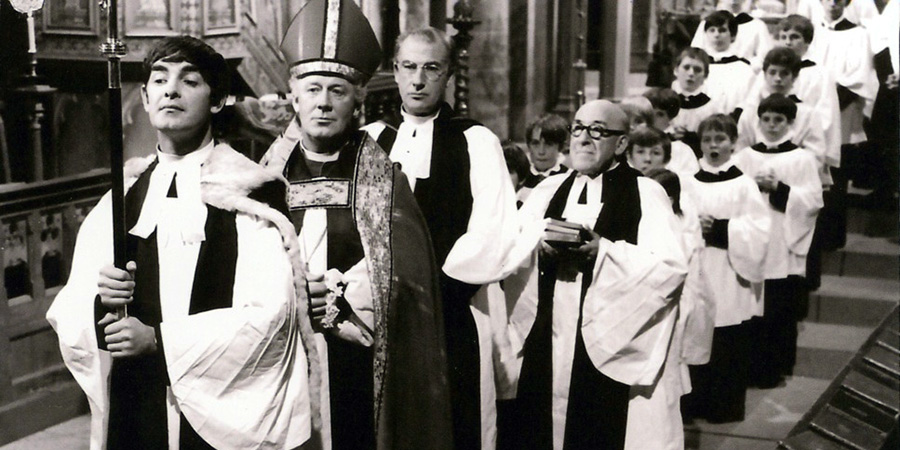
It was his trilogy of religion-related sitcom roles, however, that really established him as one of Britain's most popular comedy stars of the era. Playing the bumbling and stuttering chaplain the Revd. Mervyn Noote in All Gas And Gaiters (1966-71), the similarly incompetent monk Brother Dominic in Oh Brother! (1968-70) and the same character, this time elevated to the position of a Roman Catholic priest, in Oh Father! (1973), the tabloids dubbed him (as a compliment) 'TV's top idiot', and he was rarely off the screen.
He also found time during this heady period to make a few movies (including a cameo role alongside his fellow Quarry Bank alumnus, John Lennon, in The Beatles' 1964 feature A Hard Day's Night), host several radio programmes (such as Radio 2's 1969 series Nimmo At Noon) in addition to his TV talk shows, write a monthly column ('Life with Nimmo') for True magazine, and star in a number of very successful West End plays - the most notable of all being the musical-comedy Charlie Girl, which ran for an extraordinary 2,202 performances between 1965 and 1971. It therefore came as no surprise when, at the end of all of that, he was announced as the Variety Club's Show Business Personality of the Year.
He remained a stellar sitcom figure throughout another decade, appearing as Pauline Yates's somewhat unworldly husband in My Honourable Mrs (1975) and Rosemary Leach's dithering husband in Life Begins At Forty (1978-80) and then Nerys Hughes's old-fashioned but still romantic ex-husband in Third Time Lucky (1982). It seemed as though he would go on indefinitely in such starring sitcom vehicles. Then, surprisingly, he appeared to step away from the spotlight.
This, however, was only how it appeared to television viewers in Britain. The reality was that he was taking his own spotlight with him on a never-ending world tour.
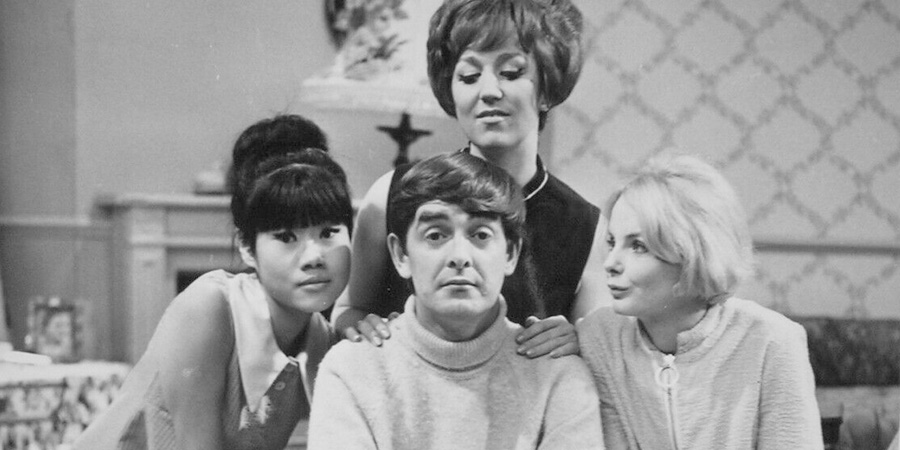
He was able to do so because of the burgeoning success of the company he had founded in 1976: Intercontinental Entertainment. The role of this company was to buy or lease the foreign touring rights of long-running West End plays, hire other British actors to take over all of the roles and then transport them on tour abroad.
It had proven a very effective, and lucrative, venture more or less from the start. The actors loved being involved, because (buoyed by regular sponsorship from British Airways, the Hilton hotel chain and various other companies) they could explore several countries and cultures whilst staying in 5-star accommodation and being paid to perform in tried and tested hits. The audiences, in turn, loved being able to have London's West End come over to visit them.
As for Nimmo himself, it represented a near-perfect combination of his favourite things: being an impresario, being a businessman, being a bon viveur and being a traveller.
Ideally for an impresario, he was a natural organiser. He had been active in Equity, the actors' union, from very early on in his career, had founded and chaired various fund-raising committees, and had also relished any opportunity to manage or promote show business projects since his time liaising with Lew and Leslie Grade.
As a businessman, he was driven by a strong and sure entrepreneurial spirit. It enabled him to keep himself ensconced in the lifestyle to which he was now so accustomed.
As a bon viveur, he was always drawn to the most glamorous, the most indulgent and the most fun things that he could find. 'The best kind of evening,' he liked to say, 'is the one you spend eating with beautiful people, drinking with beautiful people, and sleeping...with a clear conscience.'
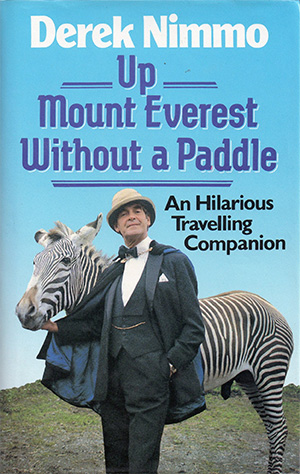
As a traveller, he had a pure and powerful sense of wanderlust. He simply adored exploring the world and enjoying whatever pleasures and adventures they had to offer (in one year alone, for example, he spent some time relaxing in Bali, saw war-torn Saigon and the human misery of what was then Bombay, was detained by police in Tel Aviv under suspicion of possessing a bomb, and was offered the still-warm blood of a hanging mountain bat in a high-class Bangkok restaurant).
While Nimmo thus thrived in his new role as a kind of revived Edwardian actor-manager, many of the day-to-day practical aspects of the tours were monitored by such able and urbane company managers as Mike Powell-Jones, Michael Boothe and James Gill, who were expert at maintaining the convivial mood that reflected the indefatigable joie de vivre attitude of their boss. It was Nimmo himself, however, who was primarily responsible for planning the productions and getting many of his fellow actors involved, and he did all of this quite brilliantly.
Intercontinental Entertainment thus became, as a result, one of the best-hidden success stories in British show business. While those viewers at home, who had grown used to regarding the small screen as their main or even sole window on to the entertainment world, might have been sitting on their sofas and wondering - in somewhat pitying tones - whatever had happened to, say (take a deep breath), Sylvia Syms, Joan Sims, Gerald Harper, John Inman, Peter Wyngarde, Simon Williams, Ian Ogilvy, Leslie Phillips, Eric Sykes, Jimmy Edwards, Alfred Marks, Andrew Sachs, Gordon Jackson, Googie Withers, Dora Bryan, Thora Hird, Peggy Mount, Liza Goddard, Carol Cleveland, Barry Evans, Tim Brooke-Taylor, Frank Windsor, Frank Williams, Frank Thornton, Patrick Cargill or Dilys Watling, the actors themselves were still very busy having a high old time playing to packed audiences abroad.
It might have been a production of Blithe Spirit at the Regent Hotel in Kuala Lumpur, or The Reluctant Debutante at the Hong Kong Hilton, or Wait Until Dark at the InterContinental Hotel in Abu Dhabi or the Ray Cooney farce Wife Begins At Forty at the Hilton in Cyprus. Nimmo and his helpers had multiple shows going on all over the place like plates spinning on sticks ('When I hire an actor,' Nimmo said, 'he has to buy a map').
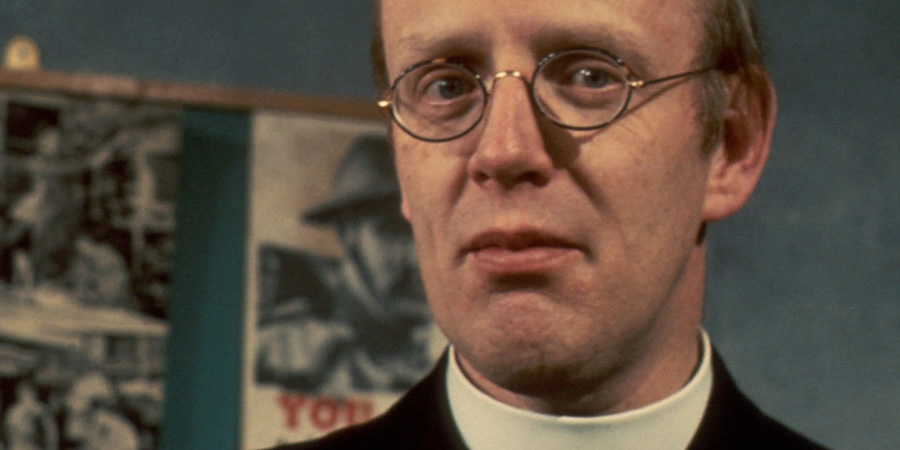
'It was wonderful fun,' Frank Williams (best known for his portrayal of the vicar Timothy Farthing in Dad's Army) would tell me. 'We'd stay in the best hotels in each location. The performances were really enjoyable. The audiences were always very attentive and appreciative. And if you were lucky enough, like I always was, to have Derek himself in the company, then all kinds of doors were opened because he was simply so well-known wherever we went. He didn't want it just to be an acting job. He wanted to make sure that we got out and about and experience real life in all of the places we'd visit, so instead of doing the usual tourist things, he'd take us to all of these exotic restaurants, or lead an expedition to an open-air street market, or meet all kinds of interesting people. On one occasion the local royal family lent us their yacht so that Derek could take all of us on a day out. The whole thing was such a memorable adventure.'
Ian Ogilvy, who had starred on TV in the Seventies in The Return Of The Saint, would agree. Writing in his autobiography Once A Saint, he recalled being on one of these so-called 'Nimmo tours': 'The pay wasn't much but, as Derek explained, you weren't doing it for the money, you were doing it because you shouldn't spend the rest of your life regretting all of the extraordinary places in the world you'd not seen, not when he was prepared to send you to lots of them, and once there put you up in the best hotels, and give you just enough money so you could buy a handmade suit in Hong Kong.'
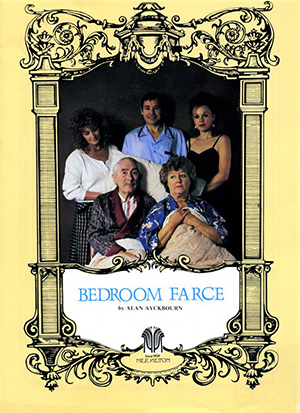
These overseas adventures not only proved a boon for those experienced performers who, as they grew older or more typecast, now found themselves increasingly overlooked for roles back home (or for those women who had paused their careers to start a family and were now looking for a chance to rebuild their confidence before returning to the auditions circuit), but also provided some excellent opportunities for those young unknowns, such as a still-teenaged Elizabeth Hurley, who were otherwise struggling to get started in the profession. Nimmo, quite deliberately, was finding work for people at both ends of the spectrum.
It did not take long, in fact, before even those actors who were still fairly busy on British screens, having listened somewhat enviously to the fond tales of laughter and luxury from friends who had already taken a tour or two, began seeking out Nimmo to secure invites for themselves. Leslie Phillips, for example, jumped at the chance to take one of his favourite comedy plays, The Man Most Likely To, out on tour around the Middle and Far East.
He encountered the odd unexpected challenge early on in his stay, such as when Elizabeth Hurley was threatened with deportation after being reported for sunbathing topless on an Abu Dhabi beach, but he soon found that Nimmo had all the right local connections, and well-honed diplomatic skills, to overcome any crisis. Phillips, as a consequence, was left to relax and enjoy his 'fun and surprisingly lucrative' working vacation without any of the worries that usually come with being the company's leading man.
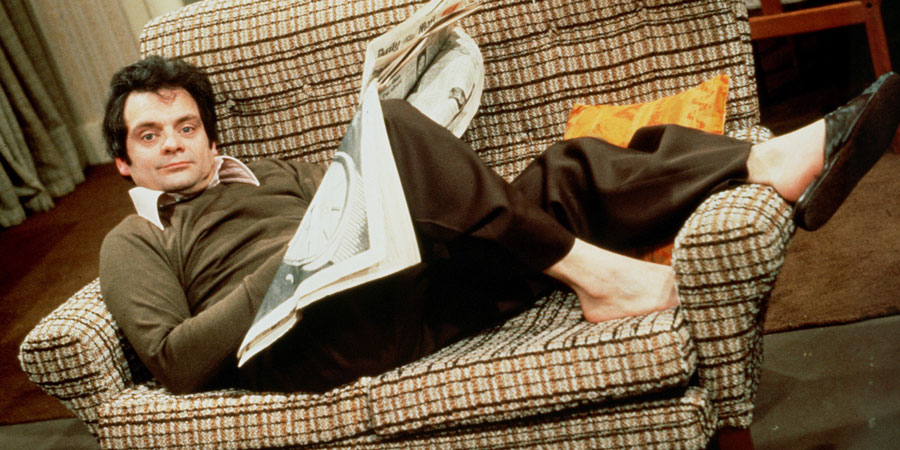
David Jason would be another established actor who was eager for a similar experience. He was already well on his way to becoming a fixture on British television, working with Ronnie Barker in Open All Hours as well as starring in his own sitcom A Sharp Intake Of Breath, when he let Nimmo know that he was keen to be considered for future productions.
Nimmo promptly signed him up for a version of the popular farce No Sex Please - We're British in Dubai, followed by The Unvarnished Truth at several venues across the Far East, and Not Now Darling in Australia (Jason would misremember this latter tour as happening in the mid-1970s - it actually took place during 1981-2, in between filming the first and second series of Only Fools And Horses). While viewers at home just assumed that he was merely 'resting', therefore, he was actually relishing a short change of scenery from an otherwise relentless TV routine.
Recalling these excursions in his memoir, My Life, Jason would admit that he was drawn to the fact that they felt like a cross between a job and a jolly: 'I loved travelling and seeing new places, and I was also of the firm opinion that the opportunity to travel and see new places at someone else's expense and while being paid should never be batted away lightly. Wages in the bin, living like a king - what could be better?'
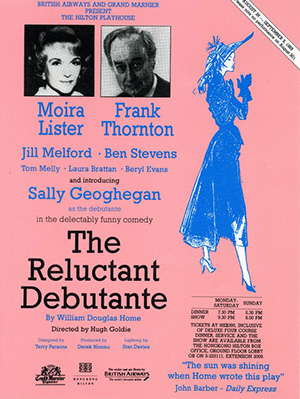
Sometimes even Jason was taken aback by the sumptuous treats that Nimmo had made sure were arranged. 'The manager of the Jakarta Hilton laid on a huge banquet for us,' he would recall, 'champagne, groaning platters of fish, shrimp, lobster and salad, servants bowing and scraping. It was like being in some kind of fairy tale. The banquet was served on a dais under a flowing awning looking out over the gardens where exotic flowers bloomed and fountains danced. The idea that acting could open up experiences like these to someone from a terraced house in Lodge Lane [in North Finchley] seemed staggering to me.'
It was not just the extra-curricular aspects of these tours that were gilded with glamour. The presentation of the productions themselves were also rather special. Nimmo was insistent that the 'look' should always be of a high standard, and so a proscenium arch stage with proper curtains, full lighting and specially-made sets were built for each new venue, and the audiences were given a four-course meal before settling back with a bottle of champagne to enjoy the show. 'The West End has lost a lot of its style,' he said at the time. 'A first night used to be quite an occasion. I'm trying to bring that back.'
Sometimes Nimmo would himself appear in a production, but on many other occasions he would be content to oversee the proceedings at a distance while seizing every chance to see the sights and enjoy some free time with his family (his 'frightfully nice' wife, Pat, sometimes helped out as a prompt, while their three 'tolerably pleasant' children were also flown over for some of the shows). Aside from the built-in perks that came from his various sponsors, he also inveigled his way into yet more plush places by waving a card vaguely at the door and announcing grandly: 'Derek Nimmo, BBC Club'.
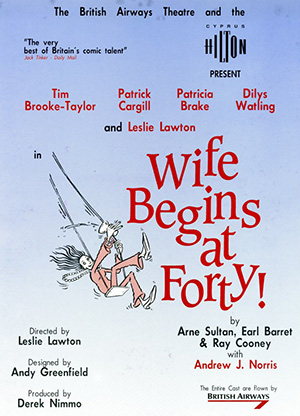
Eventually, Intercontinental Entertainment was producing plays that were being staged and seen in about thirty different countries, scattered all across Africa, Australia, North and South America and the Middle and Far East. Outside of the cities in which each show was hosted, there was little or no media coverage, and so most of the activity, in those pre-Internet days, went on well under the radar as far as the UK was concerned - but elsewhere the 'Nimmo tours' were quite a cultural and commercial phenomenon.
Nimmo himself - who would get through an eighty-page passport at least once every three years - often had to contend with some strange challenges during the course of each company's travels, but he seemed to enjoy the uncertainty of it all. There was, for example, a Spinal Tap-like confusion in Cairo, when he sent out instructions to local set-builders that included Imperial measurements, only for him to fly over and find a fifty-five-foot-high red telephone box, built to metric standards, waiting for him in the hotel car park.
There were also occasional kerfuffles at customs. 'When you arrive at somewhere like Guam,' he would recall, 'which is a tropical island, to do a play about a tropical island, and bring in your plastic palm trees and polystyrene coconuts, they look at you with some suspicion.'
One of the additional advantages of his globetrotting lifestyle was that it provided him with an unrivalled fund of reminiscences to exploit whenever he returned to Britain for another series of the radio show Just A Minute. While his fellow contestant Kenneth Williams had to rely mainly on what he had read in books, Nimmo's own travel-related anecdotes (much to Williams's irritation) were invariably about things he had experienced at first-hand:
So I sailed across the wine-dark sea to the island of Milos, passing Naxos on one side, and Paros on the other. And I thought to myself as I landed at a little quay, the first thing I must consume was a bit of an octopus...
The highest waterfall in the world is Salto Ángel in Venezuela. It's over three thousand feet tall. But my favourite waterfall of all I suppose is one that I saw on the South Island of New Zealand. I was flown out there by a little private commercial aeroplane to the top of Mount Cook, and I transferred to a Cessna. And then we flew down to the Sutherland Falls...
I think probably one of the strangest things I've seen on my travels takes place at the Batu Caves outside Kuala Lumpur in Malaysia. These great limestone rocks tower into the sky. And at four o'clock in the morning on this particular day of the year with the Thaipusam Festival, you hear the drums beginning to beat...
I like particularly going round the vineyards of Australia - McLaren Vale, Barossa Valley, Hunter, that is a wonderful part. And south of the Swan River where the Americas Cup has been taking place, they have some of the finest Chardonnay wines in the whole wide world. I bring them back in great casks, putting them into my cellar which is brimming over with the finest wines from all over the world...
I first got into a tonga actually just outside the Red Fort in New Delhi. It is as you know a two-wheeled horse drawn vehicle. And I asked them to take me to the great Lutyen's Viceroy's House...
I think when you travel around it's frightfully nice to bring back with you souvenirs. I have from Bali a wonderful Vishnu, god of the Indian mythology. And a Garuda which is a winged eagle on which he rides. From Peking I brought back a bottle which is painted on the inside with a hundred Chinese characters. And I look at that in my house. Every day I see it, I'm taken back to Old Cathay where I have such happy memories. No, souvenirs are very important. I have a brass elephant which...
These performances, however, were increasingly the only ones upon which British admirers of Nimmo could rely. Indeed, he took to joking that if they wanted to see him more often they would have to buy a long-haul air ticket.
It was not just his theatrical commitments elsewhere in the world that restricted his UK appearances. It was also partly down to his frustration at the kind of offers he was now receiving - in contrast to the much wider range of roles he could cast himself in for his foreign productions, back home he was still being offered sitcoms in which he was expected to play, yet again, comical men of the cloth, such as in Hell's Bells (1986) - and he was even losing out on many of them to a small but significant group of his more competitive contemporaries ('We all get sent the same scripts: Dickie Briers, Leslie Phillips, Ian Carmichael...').
He was also fairly disenchanted with the more general changing tastes in British broadcasting, which he felt favoured cruder and more scatological kinds of humour ('It offends me,' he said, 'so I don't watch it'). Although an unusually easy-going and tolerant figure in many ways - one spot in an episode of his talk show, filmed at the height of punk rock, had shown him visiting Malcolm McLaren and Vivienne Westwood's King's Road SEX boutique and happily interacting with the likes of Sid Vicious and Johnny Rotten - Nimmo had little time for what he regarded as alternative comedy (most of which he considered 'gibberish'), and believed that broadcasters had quickly become fixated on it at the expense of other styles and sentiments.
There was possibly a sense of frustration, and self-criticism, at the heart of his resentfulness at this time. 'I've really rather drifted, I think,' he admitted, but he had drifted in absentia, as he was still so busy abroad.
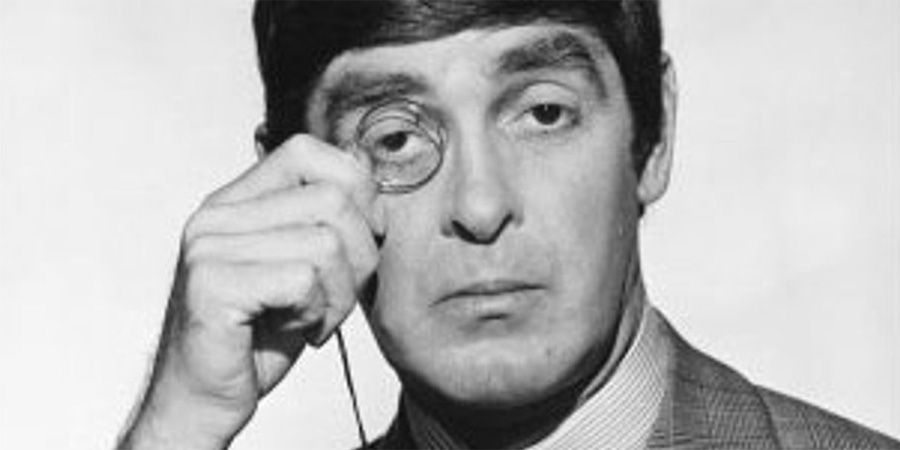
Whenever he did return home he resembled, more and more, a real-life version of Adam Adamant, the Victorian adventurer (played by his old friend Gerald Harper) who had just emerged into a strangely permissive new era after spending a century hibernating inside a thick block of ice. He became strangely agitated, for example, when he heard the news that his beloved Garrick Club was considering admitting women; tried to start a campaign against graffiti ('I don't like graffiti at the best of times, but I especially don't like graffiti I can't read'); and was mocked by the Daily Mirror, amongst others, for his increasingly antiquated style of Britishness ('With his monocle and cape, dandy Derek Nimmo's all set for a dashing night out. Trouble is, Derek, it's the 1990s...not the Naughty 90s...').
He was often the first one called whenever a journalist wanted a famous name to comment on the decline of something (manners, grammar, diction, politics, architecture, evening dress or table settings), and the celebrity on which publishers most relied if they wanted to put out something quirky on something quaint (his Wonderful Windowboxes book, for example, came out in 1990). He was also happy to lend a hand to anything that smacked of old-fashioned public spiritedness, helping raise funds for, amongst many things, personal alarms for pensioners, audio books for the blind and various 'clean-up Britain' initiatives (receiving a Queen Mother's Birthday Award for his efforts).
He did still retain a commitment to promoting theatrical comedy in the UK. He was, for instance, a founding member and director, from 1983, of the 'comic co-op' that took out a five-year lease on the Shaftesbury Theatre in London in order to establish a 'national Theatre of Comedy company', which promised cheaper seats, free programmes, in-house bars charging pub prices and plenty of new comedy productions.
The irony, however, was that he was now spending so much time exploring other countries that he rather resented having to explore the country in which, ostensibly, he still lived. He wanted to return to the Britain that he knew, and that Britain was, to an increasing extent, no longer there.
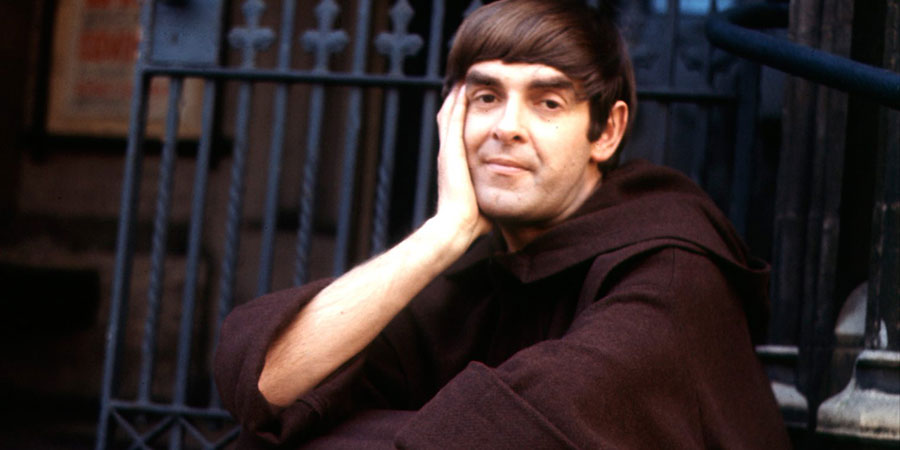
As the famous last line of The Great Gatsby put it, 'So we beat on, boats against the current, borne back ceaselessly into the past,' and that was what Derek Nimmo, in his last years, seemed to be doing. He was, now, the only Britain that he knew.
It did not really bother him that much - nothing ever did. 'The thing is,' he reflected in later years, 'I've never ever been sufficiently unhappy to realise, Gosh, how happy I've been throughout my life. I just seem always to have been happy.'
Right up to his death in 1999, he was still active abroad, promoting the best British comedies, while waiting in vain for a new one to arrive at home with a starring role in it for him. We only really got to see a fraction of what, as a comic performer, he had to offer, but at least many other countries had the chance to savour his charm.
Help us publish more great content by becoming a BCG Supporter. You'll be backing our mission to champion, celebrate and promote British comedy in all its forms: past, present and future.
We understand times are tough, but if you believe in the power of laughter we'd be honoured to have you join us. Advertising doesn't cover our costs, so every single donation matters and is put to good use. Thank you.
Love comedy? Find out moreOh Father!

All seven episodes of the BBC sitcom starring Derek Nimmo. A sequel to the late 1960s series Oh Brother!, the series follows Father Dominic (Nimmo) after he leaves Mountacres Priory and goes to work as curate to Father Harris (Laurence Naismith).
Despite his godly intentions, Father Dominic remains as disaster-prone as ever, and continues to cause all kinds of problems for those around him.
First released: Monday 24th October 2005
- Distributor: DD Home Entertainment
- Region: 2
- Discs: 1
- Minutes: 208
![]() Buy and sell old and new items
Buy and sell old and new items
Search for this product on eBay
BCG may earn commission on sales generated through the links above.
- Released: Friday 1st January 2010
- Distributor: Simply Media
- Region: 2
- Discs: 1
- Minutes: 208
- Subtitles: English
- Catalogue: 132604
![]() Buy and sell old and new items
Buy and sell old and new items
Search for this product on eBay
BCG may earn commission on sales generated through the links above.
Oh Brother!

The antics of Derek Nimmo's accident-prone Brother Dominic at Mountacres Priory regularly drew over twelve and a half million viewers to this classic BBC comedy.
This release includes all eight surviving episodes, which boast a distinguished cast including Sir Felix Aylmer as Father Anselm, the benign Prior, and Colin Gordon as Father Bernard, the less tolerant Master of Novices. The DVD includes a series guidebook.
First released: Monday 8th November 2004
- Distributor: DD Home Entertainment
- Region: 2
- Discs: 2
- Minutes: 239
![]() Buy and sell old and new items
Buy and sell old and new items
Search for this product on eBay
BCG may earn commission on sales generated through the links above.
All Gas And Gaiters - The Complete Series 1 & 2

TV's first ecclesiastical comedy, All Gas And Gaiters was enjoyed by over 10 million viewers on BBC One between 1966 and 1971. Written by husband-and-wife-team Pauline Devaney and Edwin Apps, it was so popular that every one of its scripts was revised and re-recorded for radio with (largely) the same star cast as the television series.
Robertson Hare starred as the Archdeacon of the fictional St Ogg's Cathedral. An elderly gentleman fond of a tipple and with an eye for the ladies, he shares the cloisters with his clerical companions, the easy-going Bishop (William Mervyn) and the naïve, accident-prone Chaplain (Derek Nimmo and Jonathan Cecil). All they want is a quiet life - but this wish is constantly thwarted by the overbearing Dean (John Barron) and all too often, chaos and confusion abound as they are caught up in a series of hilarious misadventures.
This collection comprises all 33 episodes of the classic comedy. Among the guest stars are David Jason, Richard Caldicot, Doris Hare, Hugh Paddick, Deryck Guyler and Julia McKenzie.
First released: Thursday 18th June 2020
- Distributor: BBC Audiobooks
- Minutes: 960
BCG may earn commission on sales generated through the links above.
All Gas And Gaiters

All 11 surviving episodes of the classic TV comedy are included in this two disc release. It also comes with a 20 page booklet.
The episodes included are: The Bishop Rides Again; The Bishop Gets The Sack; The Bishop Sees A Ghost; The Bishop Loves His Neighbour; The Bishops Heats The System; The Bishop Warms Up; The Bishop Entertains; The Bishop Gives A Present; The Bishop Shows His Loyalty; The Bishop Has A Rest; The Bishop Loses His Chaplain.
First released: Monday 3rd November 2003
- Distributor: DD Home Entertainment
- Region: 2
- Discs: 2
- Catalogue: 106809
![]() Buy and sell old and new items
Buy and sell old and new items
Search for this product on eBay
BCG may earn commission on sales generated through the links above.
- Released: Monday 2nd November 2009
- Distributor: Simply Media
- Region: 2
- Discs: 2
- Minutes: 330
- Subtitles: English
- Catalogue: 132601
![]() Buy and sell old and new items
Buy and sell old and new items
Search for this product on eBay
BCG may earn commission on sales generated through the links above.

